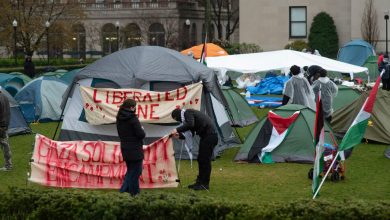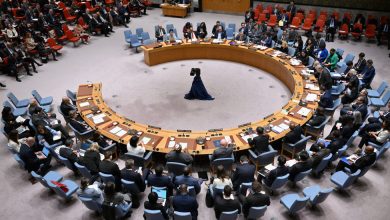Message to Prince Charles: This Is Not Your Father’s Egypt

GIZA, Egypt — The royal visit was tightly choreographed. The Egyptian authorities closed the roads, cleared the trash and banished the camel drivers, hawkers and tourists, keen to showcase the pyramids to Prince Charles and Camilla, Duchess of Cornwall. But nobody accounted for the stray dog.
Conspicuously dingy, it ambled across the road, tail wagging, just as the royal black BMW pulled up to the Great Pyramid. Frantic shooing ensued. The dog trotted off, the men in suits exhaled. Their Royal Highnesses posed, smiled, and set off on a guided tour, Charles holding Camilla’s arm to steady her over the rocks.
The tour on Thursday afternoon was the royals’ first visit to Egypt since 2006 and their first travel outside Britain since the coronavirus pandemic began, a trip royals watchers found all the more watchable given the fragile health of Charles’s mother, Queen Elizabeth II, who has ceded travel duties to her son.
But the Egypt Charles saw was not the same Egypt he had seen 15 years ago, nor, for that matter, the Egypt a previous Prince of Wales had visited on camelback in 1889, seven years after Britain conquered Egypt and began its six-decade-long occupation.
Stray dog notwithstanding, this Egypt is nobody’s colony.
The royals’ next stop after the pyramids on Thursday said much about where Egypt, under the rule of President Abdel Fattah el-Sisi, sees itself going: a sleek new restaurant overlooking the pyramids that is one of the jewels of the government’s drive to spruce up its star attraction, where tumbling trash and overeager touts have tended to blur its majesty.
In fact, Mr. el-Sisi has a makeover planned for practically all of Egypt. In his rush to modernize the Arab world’s most populous country, he is building a sprawling new capital city, constructing new roads and bridges through central Cairo, razing poor informal neighborhoods and even eliminating tuk-tuks, the three-wheeled taxis used in many poor countries.
After years of political turmoil and violence that followed Egypt’s 2011 revolution, Mr. el-Sisi, who rode popular backing to power after a military coup toppled the elected president in 2013, has also repositioned the country as a regional heavyweight: the host of the next United Nations climate summit, a rising competitor in the natural gas industry, a business destination for European energy and defense giants, and a valued partner for the United States on the Israel-Palestine question.
“For Egypt, this visit marks an important next step as the regime continues to rehabilitate its image,” said Hafsa Halawa, an Egyptian-Iraqi-British nonresident scholar at the Middle East Institute. The visit, she said, “rubber-stamps this growing self-confidence for the regime.”
All this, despite the ever-escalating repression and human rights abuses that have shaped Mr. el-Sisi’s rule. The day before Charles and Camilla arrived, an Egyptian court sentenced three prominent opposition figures to extended prison terms.
For two countries with such fraught history — Britain ruled Egypt as a colony in all but name until the 1950s, conscripting peasant labor, violently putting down the opposition and controlling Egypt’s finances — there was little tension surrounding the royals’ arrival. (The main objections on the Egyptian side came from Princess Diana partisans, who greeted the visit with gripes about Charles’s treatment of his ex-wife.)
Vestiges of British rule remain in Cairo, from the former British officers’ club where upper-class Egyptians can still play croquet, to the downtown square named for Egypt’s liberation. But Britons in Egypt are more likely to hear Egyptians lighting up over Manchester United and Mohamed Salah, the Egyptian soccer star who plays for Liverpool, than complaining about Britain’s longtime control of the Suez Canal. Some Egyptians even praise the British for building trains and other infrastructure, though these were originally constructed to serve British economic interests.
Nowadays, the relationship is cheery, with Egypt welcoming substantial British investment and trade. Charles’s longtime climate advocacy made the visit a handover of sorts of hosting duties for the global climate conference, which was held inGlasgow this year and will come to Egypt next year. The couple was to continue to Alexandria on Friday before returning to Britain.
In a nod to Charles’s interest in religious diversity, the royals went from meeting with Mr. el-Sisi on Thursday to Al-Azhar, the most influential center of Muslim learning in Sunni Islam.
Then it was on to the pyramids, where the government has brought in one of Egypt’s biggest conglomerates to construct new restaurants and a new visitor center, develop a sound-and-light show and ferry tourists around in a new electric bus system.
Not far away stood the Grand Egyptian Museum, scheduled to open at the pyramids next year after many years’ delay as one of the world’s biggest museums. Its gray, angular bulk could scarcely contrast more with the dusty-pink Neo-Classicism of the 119-year-old Egyptian Museum in downtown Cairo, which it is meant to replace.
Every week, a little more of the old museum’s treasures are trucked to the new. Some watch the emptying of the building, with its genteel, tattered charm, with sorrow. But it is hard to deny the symbolic appeal of transferring Egypt’s Pharaonic heritage away from an institution dreamed up by Europeans — a building bearing the names of some of the all-European Egyptologists who hauled many of Egypt’s most significant artifacts back to Europe — and into an Egyptian-built museum.
Europe’s enduring possession of some of Egypt’s most famous antiquities, including the Rosetta Stone, which sits in the British Museum, is just one sore point in Egypt’s tortured relationship with the West.
Egyptian society, or at least its upper echelons, has tilted westward at least since Khedive Ismail, Egypt’s then-ruler, remade downtown Cairo with Parisian-style boulevards and European-style facades in the 1860s. Today, affluent Egyptians buy homes in gated communities with names like Beverly Hills; they make sure their children learn English, even if at the expense of classical Arabic, at private international schools with names like Malvern College.
“When you say barra — ‘abroad’ in Egyptian Arabic — the implication is automatically of somewhere better,” Youssef Rakha, an Egyptian novelist, wrote in a 2020 essay, “Barra and Zaman.”
Mr. el-Sisi, too, craves validation from the West, as his attempts to get a face-to-face meeting with President Biden attest. But his government also lashes out against the West to rally Egyptians around his regime, blaming dissent on foreign meddling, prosecuting advocacy groups on politically motivated charges of receiving foreign funding and hitting back on Western criticism of Egypt’s human rights record.
Vilifying the West might be little more than nationalist chest-thumping now, but it is rooted in a searing struggle against British occupation.
To put down the opposition, it was the British who first created many of the repressive tactics the Egyptian authoritarians who succeeded them later used on their citizens.
“The irony there is that many of the techniques and institutions that the Egyptian state has deployed to arrest, torture, sometimes murder its perceived enemies were implemented and developed to sustain de facto British colonial rule,” said Aaron Jakes, a history professor at The New School who wrote the book, “Egypt’s Occupation: Colonial Economism and the Crises of Capitalism.”
British occupiers dismissed the Egyptians as backward, unfit to rule themselves. Mr. el-Sisi, too, often appears to think little of Egyptians, whom he frequently admonishes to lose weight and stop having so many children.
Maybe that was why the authorities spent the hours before Charles and Camilla’s arrival at the pyramids shooing away most of the Egyptians.
The road, newly emptied of coffee carts and roasted sweet potato vendors, was lined instead with police officers and fluttering Union Jacks. The pyramids were, for once, camel-less. Only the stray dogs remained.




